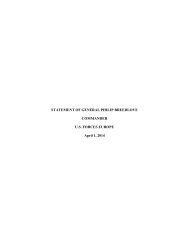FULLTEXT01
FULLTEXT01
FULLTEXT01
You also want an ePaper? Increase the reach of your titles
YUMPU automatically turns print PDFs into web optimized ePapers that Google loves.
TACTICAL THOUGHT<br />
2014 September 29 th<br />
In the area of ”Tactics in general" the following was addressed;<br />
- Important to have a Swedish approach and not solely rely on foreign doctrines, and<br />
from a Swedish thought take the tactical discussions.<br />
- Important to remember tactics at different levels and understand the need for<br />
different types of units that can be combined into composite forces. Tactics cannot<br />
be one-dimensional time-space-force thinking.<br />
- Important with knowledge on unit capabilities to create composite task groups (also<br />
at low-levels) and to lead them. New capability needs are for example UAVs, IEDD<br />
and dogs.<br />
- Tactics discussions will increase in line with the transformation stabilizing.<br />
However, a rough road lies ahead especially for a brand new unit concept such as at<br />
P7.<br />
- Some units are often excluded in discussions on IW, such as tank units. Removes<br />
creative thinking. For example tanks with barricade-fences, which definitely make<br />
people move away.<br />
- Extensive need for breadth of possible resources, from conversation skills with<br />
villagers to battalion attacks with indirect fire and air support<br />
- Tactics are controlled by the financial framework<br />
- Every conflict and every mandate has its frames. We have mostly been on the<br />
defensive side, but in these operations an offensive approach is needed.<br />
- Tactics are given little space (not even prior to the operations)<br />
- Danger of excessively equating IW/COIN with Afghanistan<br />
- Initiatives are important, requires on-going analysis, planning and action.<br />
- How to measure success.<br />
In the area of "Education / training", the following was addressed;<br />
- We need to educate younger colleagues at the schools better; insight that sometimes<br />
it is not black or white but there are grey areas. Everything has its time.<br />
- The second lieutenants are very dynamic, specialist officers are more stereotypical.<br />
Difficulties when all platoon leaders have exactly the same tactical thinking.<br />
- Increased requirement for training platoon leaders in complex tasks. Not existing<br />
today.<br />
- Must know the basics first. Warning for quick tactics and fighting style adaption.<br />
The regulations apply. Skills to shoot at long ranges come first.<br />
- Once the Major Course and the Basic Officer Course read the same military theory,<br />
it will result in completely different tactical thinking as personal experiences and<br />
perspectives are completely different.<br />
- More command training for complex situations and composite units. Today, it is a<br />
short time at the regiment Livgardet and tomorrow, the need remains if smaller units<br />
are to be deployed abroad.<br />
- Field manuals, doctrines, books are one thing - what matters is how they are<br />
practised. It is practised well at Livgardet training section for international missions<br />
up to company level.<br />
- Important to have good trainers, it is not enough with a good theory. National<br />
training teams for certain things might be needed.<br />
- More emphasis on training of the units, not just officer training.<br />
13





